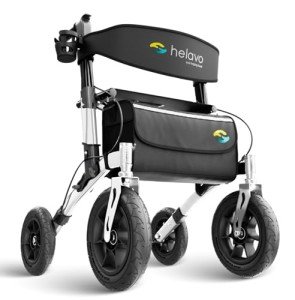Guide To Senior Walker: The Intermediate Guide On Senior Walker
페이지 정보

본문
A Comprehensive Guide to Medical Walkers: Enhancing Mobility and Independence
In the realm of healthcare, mobility plays an important role in rehab and overall wellness, especially for seniors and those recuperating from injuries. Amongst the myriad of mobility help readily available today, medical walkers stick out as flexible tools that help with motion and enhance independence. This post will dig into the types, benefits, considerations, and FAQs regarding medical walkers.
What is a Medical Walker?
A medical walker, frequently referred to as a walking frame, is a supportive device created to assist people with mobility challenges walk with higher stability and ease. Walkers offer a more comprehensive base of support compared to walking sticks and crutches, making them ideal for those with balance concerns or restricted strength.

Kinds Of Medical Walkers
| Type | Description | Features |
|---|---|---|
| Standard Senior Walker | A basic four-legged frame without wheels, used mostly for stability. | Lightweight, sturdy, adjustable height, ideal for indoor and outdoor usage. |
| Wheeled Walker (Reliable Rollator Walker) | A Stylish Walker with wheels on the front legs, enabling simpler movement. | Equipped with hand brakes, a seat for resting, and storage options. |
| Hemi Walker | A walker designed for people who can use one arm and require support. | Lightweight and compact, features a curved manage for simpler gripping. |
| Bariatric Walker | Designed for bigger people, offering increased weight capacity and stability. | Enhanced durability, wider frame, and supportive features for much heavier users. |
| Knee Walker | A distinct option for those with leg injuries, allowing them to rest the knee. | A platform to support the injured leg, guiding capabilities, and brakes. |
Advantages of Using a Medical Walker
- Improved Stability: Walkers provide additional points of contact with the ground, leading to a more stable walking experience.
- Increased Independence: Users can browse their environment without requiring assistance, enhancing confidence and self-reliance.
- Enhanced Safety: The threat of falls is significantly minimized, as walkers use support to those with balance problems.
- Versatile Usage: Many walkers are designed for both indoor and outdoor usage, adapting to various terrains.
- Assistance during Rehabilitation: Medical walkers are important throughout recovery from surgeries, injuries, or diseases.
Factors to consider When Choosing a Medical Walker
When selecting a medical walker, various aspects should be remembered:
| Consideration | Description |
|---|---|
| User's Condition | Evaluate the individual's strength, coordination, and specific requirements. |
| Devices Weight | Make sure the walker is lightweight enough for easy handling however sturdy enough for support. |
| Adjustable Height | The walker should be adjustable to fit the user's height for optimum convenience and functionality. |
| Hand Grip Comfort | Examine that the grips are comfortable to hold for prolonged durations. |
| Weight Capacity | Guarantee the walker can support the user's weight, especially for bariatric walkers. |
| Storage Needs | Determine if additional features like baskets or trays are essential for bring products. |
Often Asked Questions (FAQs)
How do I identify if I need a walker?If you experience difficulty in keeping balance, feel unstable walking, or require assistance on flat surfaces or inclines, it's suggested to seek advice from a health care expert for an assessment. Can I use a walker outdoors?Yes, specially created
walkers with larger wheels(wheeled walkers or rollators)appropriate for outdoor use and can handle numerous terrains effectively. How do I maintain my walker?Regularly inspect the walker for loose parts, ensure wheels are oiled if
relevant, and clean it as needed. Seek advice from
the maker's guidelines for specific upkeep directions. Are walkers covered by insurance?Many insurance prepares offer coverage for walkers, but it is vital to contact your supplier to understand your specific policy
details. Can a walker help with physical therapy?Yes, using
a walker can support rehab efforts by offering stability during exercises suggested by physio therapists. Medical walkers are invaluable tools that not
only assist in motion and self-reliance but also considerably enhance the lifestyle for people dealing with mobility obstacles. With numerous types offered, choosing the ideal walker is
essential to meeting specific needs. The journey to restoring mobility can be complicated, however with the best equipment and support, people can overcome barriers and reclaim their self-reliance. By understanding the kinds of walkers, their benefits, and vital considerations, users can make educated options-- resulting in a more secure, more confident way of moving through life. Whether it's a rollator for outdoor experiences or a simple walker for indoor navigation, the Best Rollator Walker walker can open doors to newly found liberty and enhancement in daily life.
- 이전글Exploring the Different Types of Casino Games 25.09.27
- 다음글How To Create An Awesome Instagram Video About Free Delivery Sofas UK 25.09.27
댓글목록
등록된 댓글이 없습니다.


